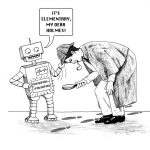I have to pass along this wonderful conversation about The Book of Why that took place on Facebook. A friend of mine sent me a link to it; I do not know any of the commenters personally. More than any sales numbers or Amazon rankings, this conversation warmed my heart because it shows that our readers are “getting it.” I’ll copy the whole conversation below, using only first initials in case they would prefer to maintain their anonymity.
E: Judea Pearl’s new book is enormously impressive; it could end up being more important than his 1988 book. [Includes link to the book at Basicbooks.com.] (10 Likes, 8 Shares, 9 Comments.)
P: Cool! I have a long overseas trip coming up in a few weeks and was considering this for my kindle. Sold! Double sold because I’ve been working on causation and counterfactuals for so many years and he’s preaching to the choir.
A: Great! Have you read it E.?
F: I am reading it right now. Really good reading! I strongly recommend it!
H: Thanks for posting this. Can someone say in one or two concrete sentences, what they think is great about the book?
E: A: I’m about 2/3 of the way through. H: This has been the most dramatic experience I’ve had in many years where you read a really simple idea — essentially, rather than avoiding any mention of causality as if it were Sasquatch, statistics should use causal models systematically — and that simple idea makes all kinds of things enormously clearer. It’s not obvious immediately in the book, which starts a little slow, but by the time you get to the chapter on Confounders it’s dazzling. Pearl and others have been doing this for some years now, but (embarrassingly) I wasn’t aware of it, so this comes as a revelation.
H: Great, thanks, my mouth started watering and I will buy it now.
F: I really loved the historical perspective!
E: I’m curious to know what is the reaction in the mainstream statistics world — people like Andrew Gelman, for instance, or for that matter Nate Silver. If anyone sees a review or discussion, please post.
T: It’s SO good.
As it turns out, the original poster is somebody whom Judea, my co-author, is acquainted with. When I sent this conversation to Judea, he responded with his typically wry sense of humor: “Strange. To get your colleagues to understand what you do, you need to go behind their back and write to the general public.” I replied to him, “If you are going behind their back, it is only because they have turned their backs on the public.”
In our culture, scientists (with a few notable exceptions) have perhaps lost the knack of addressing themselves directly to the public. Perhaps this book can help persuade them that it’s worth the trouble. If you state your case in terms that ordinary people can understand, you just might find that your colleagues understand you better, too!
Many thanks to A, E, F, H, P, and T for their enthusiastic and unsolicited praise. By the way, I loved E’s line about Sasquatch. I might use that line in the future myself!



